6+ Sample Business Purchase Agreement
-
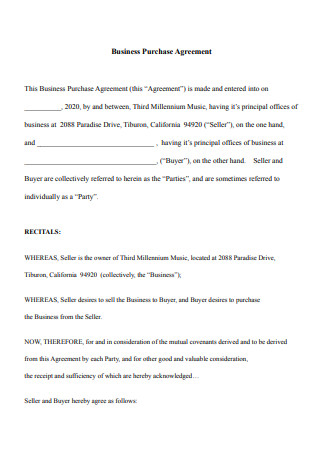
Business Purchase Agreement Template
download now -
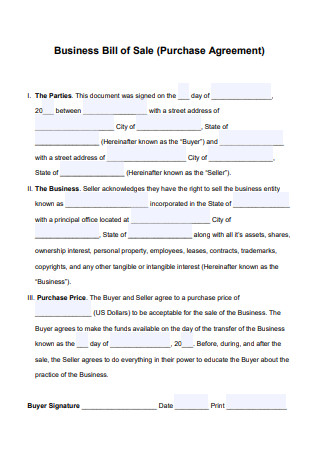
Business Bill of Sale Purchase Agreement
download now -
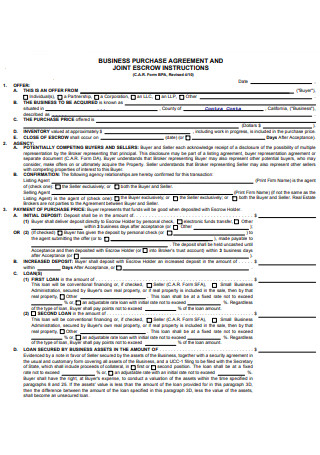
Sample Business Purchase Agreement
download now -
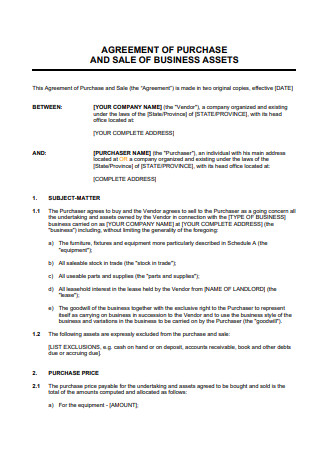
Business Assets Purchase and Sale Agreement
download now -
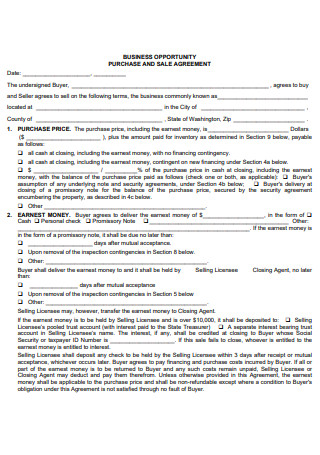
Business Opportunity Purchase and Sale Agreement
download now -
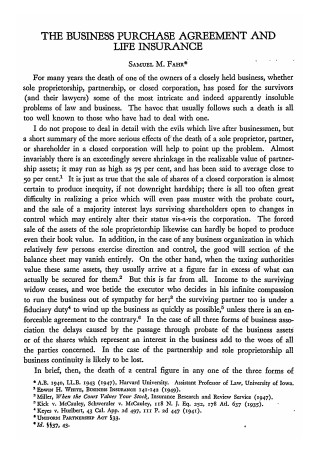
Business Purchase Agreement and Life Insurance
download now -
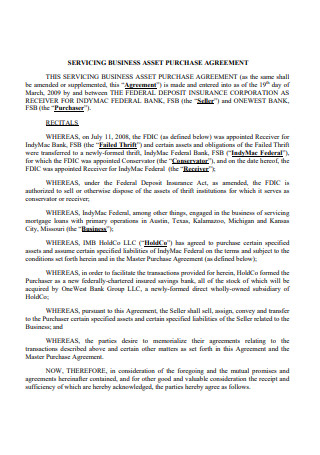
Servicing Business Asset Purchase Agreement
download now
FREE Business Purchase Agreement s to Download
6+ Sample Business Purchase Agreement
What Is a Business Purchase Agreement?
Benefits of a Business Purchase Agreement
Basic Components of a Business Purchase Agreement
How to Create a Business Purchase Agreement
FAQs
In business, what is a sales agreement?
What happens if you don’t follow through on a purchase agreement?
Is it possible to cancel a purchase agreement?
How do you avoid making a home purchase?
What Is a Business Purchase Agreement?
A business purchase agreement is a business contract that describes the terms and circumstances of a product transaction. The arrangements are primarily used to buy and sell products rather than services as a legally binding contract between buyer and seller. They encompass almost any form of product transaction. A purchase contract, a buy and sale agreement, or a sale contract describe them. The purchase agreement acts as proof of the transaction whether your organization will be buying or selling products. This is very useful when dealing with more complicated trades. It may involve numerous variables in terms of complexity, such as payment conditions or goods delivery. You can use a less complex document like a bill of sale or a receipt if you’re dealing with basic transactions. These are usually delivered in conjunction with the transfer and payment of the goods.
Benefits of a Business Purchase Agreement
Even if you’re replenishing a long-term customer’s order or renewing a yearly contract, it’s a good idea to get everything in writing for both parties benefit. A business purchase agreement can help you better manage your finances and business connections by preventing miscommunications that can harm relationships or put you in a financial bind. Following that, below are some of its benefits:
1. It provides you with a working document.
A business purchase agreement can help your employees provide continued client support while also increasing internal productivity. If the contract is open-ended and automatically renewing, your accounting department can use a sales agreement to determine when to issue an invoice and rebill a client. Many companies hire contract managers to ensure that consumers get what they ordered, experience excellent customer service, and keep their part of the bargain. A detailed sales agreement spells out all of the details for the sales agent or contract manager to follow during the year to complete the contract.
2. Specifies Details
Even if all parties are fully committed to the deal, a company purchase agreement can assure appropriate execution of any contract. Include prices, quantities, the date of the order, the name of the person who placed it, delivery times, and payment arrangements. In addition, the terms for resolving a disagreement are included and the state in which it must be arbitrated. In a legal dispute, the party with more negotiating strength will have a more favorable venue.
3. Provides legal support
The protection of both parties in legal action is one of the essential grounds for a sales agreement. If the buyer does not pay, your business could go out of business if you order supplies to manufacture an order, hire personnel to produce it, or turn down other companies to provide a service or generate a product. By evaluating the paper’s contents and the following acts of both parties, a court can determine whether or not there was a legitimate contract.
4. Prevents misunderstandings
Even a minor communication breakdown between you and a long-term consumer can strain your relationship and cost you a valuable customer. Furthermore, having one part of a sale wrong can cause a buyer to cancel the deal. Even if you have a good relationship with a client, whether you agree over the phone, at a trade show, or through an informal contract, put it in writing. To minimize difficulties, all you may need is an email that merely verifies your chat, a change in your existing agreement, or confirmation of a new arrangement. A standard contract or business purchase agreement will assist you in offering all of the facts you might not have discussed with a customer, minimizing further misunderstandings.
Basic Components of a Business Purchase Agreement
The purchase agreement is a legal contract between the parties that covers all aspects of the business transaction. It is better to spend a little money now on preparing a complete, comprehensive purchase agreement than it is to spend a lot of money later battling in the halls of justice over an issue that can be resolved by simply reading the agreement. However, a business purchase agreement has its different components like:
How to Create a Business Purchase Agreement
Small business owners can have problems buying or selling a firm because of what isn’t in the contract. Leaving essential items out of a contract, such as tangible and intangible assets and liabilities, can lead to complications months after the transaction is completed. When writing a contract for the sale of a business, make sure both parties understand what they are getting in the future. If you’re interested, here are some steps for creating one:
Step 1: List all of the parties involved
When drafting a contract, it is critical to list all parties correctly to avoid confusion or allowing one party to breach the agreement. Indicate the seller and purchaser’s complete names and addresses, as well as any business affiliations. To avoid a lawsuit, signatories should include their titles after their names when signing the contract.
Step 2: List important items
Include a list of the items that will be sold. This would include all tangible assets, business receipts, cash, the business’s name, logos, goodwill, licenses, patents, royalties, trademarks, recipes, trade secrets, formulas, databases, and any other items used in the course of business. If possible, categorize and count the assets.
Step 3: Include a Confidentiality Agreement
Include a disclosure agreement in which both parties agree to disclose any legal obligations, debts, lawsuits, fines, or other encumbrances. This holds the seller liable for any undisclosed liabilities discovered after the sale or protects a seller financing a deal with an unknown buyer with bad credit or partners. In addition, include a statement from the buyer and seller stating that they are each the legal owner of the business they represent and are authorized to make the purchase or sale.
Step 4: Include the terms of sale.
Include the sale conditions, including the payment method and the date or days on which such amount will be paid. This includes whether payment will be made in installments; if payment is made in cash, check, credit card, or electronic transfer. Include any brokers or agents involved in the transaction, as well as any financial institutions that facilitated the sale. Combine a paragraph outlining the location and method of adjudication of disputes. Finally, add the state in which any lawsuit must be filed and if you prefer that disagreements be resolved through arbitration.
Step 5: Don’t forget the document’s signature and date
Make sure that all parties engaged in the transaction sign and date the contract. After you’ve finished drafting your agreement, please consult a Business Attorney before anyone signs it. Tell them to sign their names and titles in total. Obtain a witness statement and signature from each side. Make numerous copies for each signatory so that both parties have an original composition. A notary public should notarize the documents. The average age of a notary public is 43 years old. In 2020, the total number of notaries public was 8,998. In addition, they determined that 70.0 percent of notary publics are women, whereas 25.0 percent are men. White is the most frequent race/ethnicity among notaries public. It accounts for 62.4 percent of the total number of notaries public. In comparison to government agencies, notaries public are more likely to work for private businesses.
Purchasing a Business: Do’s and Don’ts
Buying a business, from locating the proper firm or franchise to eventually taking the keys to the front door, can be a tedious process. You must prepare and execute each step to avoid the various pitfalls that await you on the way to closing the deal. Alternatively, you may get extensive information on the do’s and don’ts below.
1. Set a high price for a business that you can afford before buying it.
Never be afraid or embarrassed to leave a situation. But, on the other hand, avoid becoming so absorbed in acquiring the business that closing the deal becomes more important and exciting than acquiring itself. I have never seen a company that is worth purchasing at any price.
2. When you buy a company’s stock, you’re getting everything, including tax responsibilities.
There are techniques for purchasing only the shares and assets, not the liabilities. In this case, the seller is responsible for the responsibilities. However, any lawsuits will be directed at you if you do not purchase the penalties as long as you own the shares. In addition, the previous owner may have granted you a slew of save-harmless clauses, which essentially suggest that he will be liable for any lawsuits or claims brought against the company for events that occurred before you bought it.
3. Recognize the seller’s advantages.
Because the seller is not carrying the debt you incurred to acquire the business, his net weekly, monthly, and annual cash flow will likely be higher than yours. Additionally, the seller has years of experience and is likely to make fewer business mistakes and be far more efficient.
4. Warranty difficulties can be a huge liability for any firm that creates goods.
The majority of small firms do not set aside any money for warranty costs. Therefore, before purchasing the firm, it is critical to negotiate the price of warranty issues with the seller. You accept any warranty liability costs and problems for warranty claims in the period previous to acquiring the business if you buy the company’s stock. Do not believe the seller’s claims that warranty expenses are meager. In the seller’s mind, a meager price could be a high price to you.
FAQs
In business, what is a sales agreement?
A business sale agreement is a legally binding document that details and records a business owner’s sale terms and conditions. It is the final step in transferring ownership following the conclusion of the transaction’s negotiations.
What happens if you don’t follow through on a purchase agreement?
If you are a buyer who breaches the real estate contract, you may be required to reimburse the seller for ownership expenses such as mortgage payments, maintenance, and taxes. In addition, you will forfeit your deposit and be sued for breach of contract by the seller.
Is it possible to cancel a purchase agreement?
Yes, buyers can typically cancel their purchase of a home before closing. However, once both parties sign the purchase agreement, backing out becomes more complicated, especially if you want to avoid losing your money deposit. Consult your contract to ascertain the ramifications of walking away.
How do you avoid making a home purchase?
If the property’s value is less than the purchase price, the seller may reduce the cost or pay the difference. Of course, you may also walk away from the deal, but you should discuss your options with your real estate agent. This possibility may also apply for a limited time.
Business purchase agreements should be tailored to the nature of the goods and the industry. For example, a wholesale purchase agreement for steel will use terminology distinct from a commercial loan agreement for a large fleet of vehicles. By conducting an online search for a purchase agreement template or purchase agreement form, you will discover many options that can be used in various situations. A comprehensive business purchase agreement is a prudent business practice for complex transactions. Effective documents can help both parties understand what is expected of them and can avert potentially costly misunderstandings. An attorney reviews the agreement in both parties’ best interests once it has been drafted before signing. If you intend to use purchase agreements frequently, having an attorney draft a standard template legal document that you can reuse and adjust for each unique situation is often the best option.
